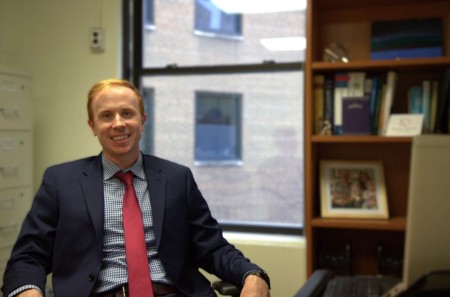Unlocking the Potential of Non-Pharmacological Cancer Symptom Management
 Cancer research isn't just about finding a cure; it's about improving the quality of life for those undergoing treatment. Robert Knoerl, Ph.D., RN, assistant professor at the University of Michigan School of Nursing (UMSN), has dedicated his time and resources to discovering the intricacies and motivations behind non-pharmacological interventions, their impact on symptom management, and the future of cancer research.
Cancer research isn't just about finding a cure; it's about improving the quality of life for those undergoing treatment. Robert Knoerl, Ph.D., RN, assistant professor at the University of Michigan School of Nursing (UMSN), has dedicated his time and resources to discovering the intricacies and motivations behind non-pharmacological interventions, their impact on symptom management, and the future of cancer research.
Innovative Research with Promising Results
As a relatively young researcher, Dr. Knoerl graduated from UMSN in 2017 with his Ph.D. and has hit the ground running. With a holistic and patient-centered approach, he’s been able to address a wide range of symptoms that span various cancer types. By focusing on the symptoms rather than the type of cancer, his work aims to provide personalized and effective interventions for a broader patient population.
Among the studies he’s led, two stand out for their innovative approaches and promising results: music therapy for anxiety and yoga for chronic neuropathy.
Music Therapy: A pilot study involving adolescents and young adults with cancer revealed that music therapy was a feasible and acceptable intervention to reduce anxiety for participants. The positive reception of this intervention has led to a larger study that is under funding consideration by the National Institute of Health, which aims to further validate these findings and expand the scope of the research.
Yoga for Chronic Neuropathy: Another pilot study explored the benefits of yoga for patients suffering from chronic neuropathy. This study was one of the first trials to explore yoga for chronic neuropathy, a condition for which there are currently no known non-drug treatments.
Cancer Research and Health Equity
Dr. Knoerl notes addressing health equity is a complex challenge in oncology research. He acknowledges that most studies have been conducted at larger academic institutions, which may not capture the diversity of the broader population. This limitation highlights the need for strategies to recruit more diverse samples and ensure that effective treatments are accessible to all patients.
Behavioral interventions, in particular, pose unique challenges to investigators such as Dr. Knoerl. “People may not have equal access to these treatments due to various barriers such as cost, location, and availability,” he said. To overcome these obstacles, Dr. Knoerl has focused on tailoring interventions to be more accessible, including delivering them in remote or virtual formats.
The Future of Cancer Research
Looking ahead, Dr. Knoerl envisions his pilot studies maturing into clinical trials across the country within the next three to five years to develop and validate promising non-pharmacological treatments for symptoms such as anxiety, fatigue, and neuropathy. By doing so, heis confident he can create interventions that are effective and widely accessible to ultimately improve the quality of life for cancer patients on a larger scale.
Inspiring the Next Generation
Dr. Knoerl offers valuable insights to students considering a career in cancer research. “While direct patient care is incredibly impactful, research offers the opportunity to influence health policy and care delivery on a broader scale.”
“Through research, it's possible to develop new treatments that can enhance the lives of countless individuals.”





